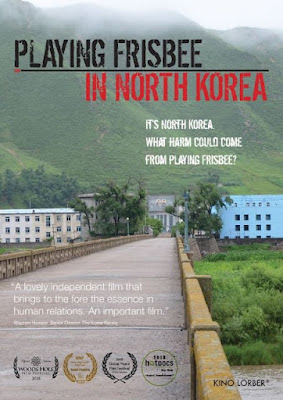One of the pleasures of traveling is the experience of exploring new cities and countries on your own and maybe even getting a little lost. That opportunity is not available in North Korea. Those who participate in state-run tours have to get on the bus and stay on the damn bus. Taking pictures out the windows is not an option either. As a result, filmmaker Savanna Washington was strictly limited in what she could film, even surreptitiously, but at least she was always aware her minders were minding her (and telling the regime’s propaganda lies) during the trip she documents in Playing Frisbee in North Korea, which releases today on DVD.
Washington understood she might be one of the first African Americans many of the North Korean locals had ever seen. Unfortunately, she would have relatively few chances to meet them, outside of scripted tour events. The minder/guides kept a tight rein on her group, while average North Koreans were too busy with the constant struggle of simply staying alive.
It is unclear what the other “tourists” were expecting from their DPRK experience, since they are only briefly seen in the margins of Washington’s field of vision. However, she states they were all eventually exhausted by the minders’ tight control. To her credit, Washington intersperses her tour footage with expert commentary and the testimony of defectors. They clearly establish the magnitude of the famines and the severity of the Yodok prison/concentration camps. They also conclusively dispel any misplaced faith in the standards of “free” medical care offered by Communist regimes. However, several talking heads also advocate for continued and increased humanitarian food aid, due to the dire living conditions endured by average North Korean.
By including a bit of hawkishness and a bit of dovishness, Washington gives the film a good sense of balance, without letting any North Korean propaganda stand unchallenged, including their Orwellian claims the Korean War was initiated by the US and ROC, which Mads Brügger referred to as the regime’s “Mother Lie” in Red Chapel. The film culminates with the titular frisbee game. Washington choses to interpret it as proof average people really can cut through the ideology and propaganda that divides them—and that’s fair enough. After all, nobody likes to end on a downer note.
Yet, the very façade the regime choses to project is blatantly and fundamentally dysfunctional and oppressive. When you enforce a near complete isolation from the outside world, you tend to lose perspective. Watching Washington’s film could help the Kim Dynasty with that. There are still some interesting points in Frisbee, even if you have already seen a lot of North Korean docs (Kimjongilia and Camp14—Total Control Zone are two particularly good ones). Recommended as a clear-sighted look at North Korea (despite the minders’ constraints), Playing Frisbee in North Korea releases today (10/5) on DVD.

